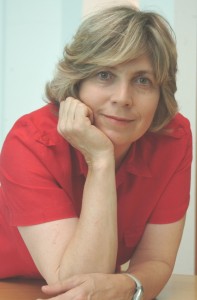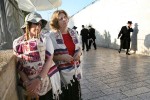Anat Hoffman, right, and another member of Women of the Wall, standing at the entrance to the Kotel in January 2013, as Charedi men look away. (photo by Michal Patelle (Women of the Wall) via Wikimedia Commons)
For more than 30 years, Anat Hoffman has been fighting for individuals’ rights. Notably, her work with Women of the Wall, which won legal recognition in 2013 for women’s right to pray at the Kotel wearing prayer shawls and using a Torah. And her more than 10 years with the Israel Religious Action Centre, which has achieved government funding for non-Orthodox rabbis, earned multiple Supreme Court decisions recognizing Reform and Conservative conversions, and won a 2011 Supreme Court ruling making gender segregation on public buses illegal.
The self-described troublemaker will be in Vancouver Nov. 15-18, speaking to several community groups, as well as addressing the Jewish community as a whole on Nov. 16, 7:30 p.m., at Temple Sholom. Her topic – From the Back of the Bus to the Top of the Agenda.
“I’m talking about the achievements of a family of organizations – Women of the Wall, the Religious Action Centre, the Jerusalem Open House, the Association for Civil Rights in Israel, all sorts, we’re a cluster of organizations for social change, and I am such an admirer of my colleagues,” said Hoffman. “And we’re all looking at the same issues: how the monolithic interpretation of Judaism in the Jewish state is limiting and stunting our ability to enjoy Judaism and celebrate it.
“In this respect, more than any other, including security, economics … we must dialogue with the Diaspora Jews. You have a stake in it, and you have an opinion. Israel is way too important to be left to the Israelis.”
She doesn’t want Diaspora Jews to be silent, she said, because there are things that Israelis can learn from them. “I’m tired of Israeli arrogance, and the feeling that we know everything,” she said. “If we know everything, how come we are in the situation we are in today on our 67th anniversary? That’s number one: I am humbled by reality and I think we could use all the help we could get.
“The second thing is, I think it’s a joint project. I think it’s the most important project of the Jewish people…. The state of Israel, the fact that we have a sovereign Jewish state, is so exciting and so wonderful, and I think we’re involved in the most important dialogue in our lives – you and I. What are the values of the Jewish state? What are Jewish values anyway? Are they the values of the Book of Joshua – smite them, kill them, annihilate them? Or the values of Isaiah? Who do we listen to, and who do we act like? I’m an Isaiah person, he’s my steering committee. I read him for inspiration and I think if he were alive in Israel today, he’d be under administrative detention – the man had no mouth control.
“So, I am driven to speak to Diaspora Jews, involve them in this dialogue and tell them to stop being quiet. If you are quiet, don’t be surprised if Jerusalem turns into Tehran, don’t be surprised if you wake up one day and you’re ashamed to even be called Jewish because of what the Jewish state is doing. You have to make your statement known today – and, it turns out, the Israeli government is very sensitive to what Canadian Jews think…. You’re not using your fantastic nuisance value. You have so much of it and you don’t use it.”
Acknowledging that Canadians are “extremely harmony-seeking and somewhat conservative,” Hoffman said people should speak up “in whatever style fits you. If Israel arrests women wearing a tallis, praying out loud and trying to have a bat mitzvah at the holiest site of the Jewish people, if this is not something right, then you should mention it.”
The morning of her phone interview with the Jewish Independent, Hoffman had attended a b’not mitzvah at the Kotel, one girl had come from Brazil, the other from the United States. “I had to stand in front of them and explain that we don’t have a Torah scroll this morning because the rabbi [Shmuel Rabinowitz] refused to give me one for these two girls – he has 100 Torah scrolls for public use. I found a way to smuggle in a Torah, but I didn’t use it today. Why? Because I didn’t want to make the Jerusalem police look like horses’ asses today because they have other things on their plate,” she said, referring to the current spate of terror attacks.
Because of the security situation, Hoffman had written Rabinowitz to ask him to make an exception that one day, and to allow the women to use one of the Kotel’s Torahs, “so that we do not burden the police with our problem,” she said. “I didn’t even get an answer.”

Despite “30 years of troublemaking,” Hoffman said she has never felt unsafe or isolated. “Not only am I not persona non grata, I was elected and reelected to the city council of Jerusalem endless times. I have 24,000 voters in this right-wing, ultra-Orthodox city. I’ve never felt threatened. My phone number is published in the phone book…. Israel is a democracy and as someone with a dissenting voice – I always was a member of the opposition – I think I was rewarded for this.”
On the issue of gender segregation in public spaces, Hoffman said victory could be declared. “We certainly don’t see new segregations going on, and the new ones are punished by the government now.”
Of the challenges that remain, she said, “Freedom of religion and pluralism, recognition of the Reform and Conservative movements, recognition of women in religion, the issue of the Wall – on these issues of pluralism, the religious establishment is very, very strong in resisting any change because any change would mean the breaking of their empire.”
Also on the morning of her interview with the Independent, former chief rabbi of Israel Yona Metzger was indicted for allegedly accepting some $2 million in bribes. “They have a corrupt system and they’re fighting to keep it because they are very spoiled and used to it, and there’s a lot of resistance to change in that power structure. That structure is the next frontier.”
Calling the Women of the Wall, “the Little Engine that Could,” Hoffman said, “We’re pushing for equality and, in the end, we will win. Am I going to see the end of this struggle? I’m not sure, it’s taking too long. But is it going to be won? There is no doubt in my mind that it will be won.”
Hoffman said she is pushing for a model she learned about in a Limmud South Africa conference a number of years ago. The presenter – Simonne Horwitz – shared stories about the small Jewish community of Saskatoon. In the winter, people help each other get to synagogue, she said, “and they don’t care if you’re Orthodox, Reform or Conservative. And the congregation, the building of the synagogue, it’s Orthodox if a majority of Orthodox show and it’s Reform if the most Reform show, and the one structure can become whatever it is that the people want it to be at that moment.”
Horwitz told the small community’s stories “with so much humor, so much joy,” said Hoffman. “I come from the largest Jewish community in the world, and I have a lot to learn from Saskatchewan, Canada.”
Hoffman said about Israel, “I want us to recognize all streams. I want our structures of religion to be able to be as pluralistic as possible. I want freedom in the market called religious services, and may the best rabbi win.”
Hoffman encouraged everyone to come hear her speak. “I would like to make sure that people who are not liberal, feminist, peacenik, that they know that they are very, very welcome to come dialogue with me. I’m very interested in speaking to more than the choir. I love to dialogue with people who are willing to look at their opinions and check them out with this Israeli. There are Israelis of many kinds. Israelis like me don’t come to your area very often, and I would very much like to dialogue with people who disagree with me, in a civilized manner. Even if you leave me with your same opinions, at least you’ve aired them out a little bit…. It’s a Jewish thing to do. We’re asked to leave our comfort zone a few times a year: when we leave home to build a sukkah, when we throw every piece of bread from our house…. So, I invite very much those people who are not in my natural habitat to come and talk to me.”
She also stressed that it is not regular Israelis who object to the changes she and her colleagues and supporters are demanding, but rather “the establishment that has so much to lose. And it’s all the folly of Israel. By giving one stream the political power, huge political budgets and the ability to monopolize all religious services in Israel, we’ve corrupted something so important for Judaism – the free spirit of criticism, the art of argument. All this is gone now because there’s only one way. Since when do the Jews have a chief rabbi? We never had a pope, never. We’ve always argued. We argued with Moses, Moses argued with God, the prophets argued with the kings, the kings wanted to resign, God resigns, Moses throws his hands up! We’ve always argued. The Talmud is one long argument. We come from a fantastic core of arguments. It all ended with the state of Israel, the argument ended, there is an establishment, the Orthodox establishment, and it’s so bad for orthodoxy, bad for Israel and bad for Judaism.”

